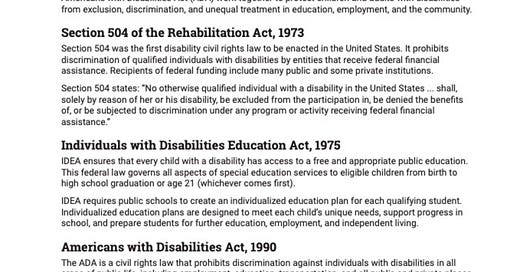Still with me?
In Part 5, we left off with me agreeing to participate in a multi-state discussion with the US Department of Education centered on how to improved unemployment, underemployment and job retention services to individuals who have been diagnosed with a disability.
Those conversations confirmed the frustrations that disability rights activists have been voicing since Richard Nixon signed the Vocational Rehabilitation Act in 1973. Despite Congressional tweaks to the Act in 1978, 1986, 1992, and 2015 the quality services and even access to those services remain an accident of geography as well as heavily dependent on self-advocacy. I was prepared for our discussions, which included perspectives from Florida, Kansas, Indiana, Kentucky, Louisiana, and Maine, to expose major differences in how each state is implementing the law. I was not prepared for, in comparison, how haphazardly Florida was managing their $200 million portion of predominately federal funds.
Pause: What’s Vocational Rehabilitation?
Well, it is part of a complex web of laws that make American daily life, such as housing, transportation, architecture, medical care, employment, school, and entrepreneurship more accessible for all.
Specifically, VR is a mix of services that can be harnessed to help both adults and students find and keep employment. Depending on each individuals interests, VR can pay for things like: medical care, home modifications, transportation, car modification, tuition, career counseling, supported work experiences, workplace support, employer support, interpreters, small business planning, and various assistive technology devices.
If you or your child has been diagnosed with a disability that led to an educational plan (IEP) or a civil rights protection plan (504), you’ve likely engaged with Vocational Rehabilitation.
So, What Happened with the USDOE Discussions?
In June of 2022, at the request of the USDOE, Office of Special Education and Rehabilitation Services, I authored a memo outlining some suggestions for improvement. I tried to keep it focused on national continuity but it was, of course, informed by my experiences in Florida.
*The correct name is Pre-Employment Transition Services so my typo is now part of our national archives. I knew I’d be famous one day!
I recommended changes to VR process, policy, and procedure. Changes that I believe would ease the bottlenecks that results in service delays. I encouraged the USDOE to provide guidance to states about improving their relationships with school districts and community based organizations. I asked them to help states be more innovative in how they serve incarcerated youth and how they could be more effective in engaging parents. My big ask centered on “relinquished funds,” which in Florida has totaled around $40.0 million dollars in unspent funds going back to the federal government since 2018. I wrote -
“It is our understanding that when SDU's are unable to spend the entirety of their funds those funds are relinquished to the USDOE to allow other states to utilize them. JFG requests RSA look for ways to release those funds directly to services providers operating in the state which originally relinquished funds. Students should be held-harmless for systemic inefficiencies for which they have no control.”
After reviewing comments from the participating organizations, representative of the USDOE began reaching out to each state to discuss our recommendations. The Vocational Rehabilitation team from Kansas, for example, were eager to explore ways to be more efficient and effective in providing services to high school students as they prepare to transition into early adulthood. The apparent reaction in Florida was different.
On Wednesday, October 12, 2022 at 4:31 PM, I received an email from the Florida Department of Education, Division of Vocational Rehabilitation notifying us that, based on an email sent by a member of my team, “indicating that JFG is simultaneously serving disabled and non-disabled students in the same classroom during the regular school day—VR staff grew concerned that JFG was potentially providing services districts were already required to provide. If this is the case, this is an impermissible duplication of effort as VR cannot pay for services federal law requires a school district to provide.” We were given until December 31, 2022 to satisfy their concerns.
One hour after receiving Brent’s email, I responded “I believe this concern has been fully addressed by USDOE RSA in both Kansas and Louisiana in regard to our program model and service delivery design. As always, we are happy to provide VR with information to satisfy your inquiry. What information, specifically, would you like us to produce?” On the morning of Friday, October 14, 2022, Brent McNeal replied “Specifically, any or all evidence that JFG services paid for by DOE/DVR are not supplanting those services school districts must already provide.”
Up Next? Let the Sparks Fly.
But before I close Part 6, allow me to point out that civil servants employed by the State of Florida agree to a code of ethics that includes language about how they are to conduct themselves.
Employees shall conduct themselves, on and off the job, in a manner that will not bring discredit or embarrassment to the state. Employees shall be courteous, considerate, respectful, and prompt in dealing with and serving the public and co-workers. Employees shall maintain high standards of honesty, integrity, and impartiality. Employees shall place the interests of the public ahead of personal interests.”





